Transform Your Outdoor Space with Landscape Gardening in Kingston
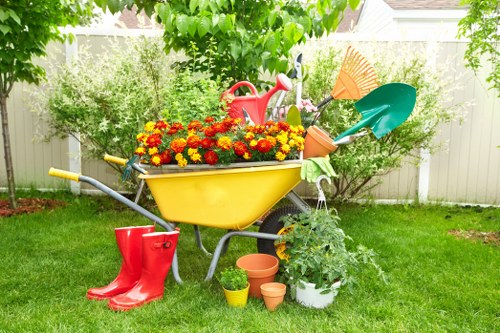
Landscape gardening in Kingston offers residents the opportunity to create stunning outdoor environments that enhance the beauty and functionality of their properties. Whether you’re looking to design a serene garden retreat, a vibrant floral display, or a practical backyard space, Kingston provides the perfect setting for diverse landscaping projects.
With the right planning and professional guidance, your garden can become a personal sanctuary, a place for family gatherings, and a visual delight for the neighborhood. Understanding the local climate, soil conditions, and plant varieties is essential to achieving a thriving and sustainable garden.
In this comprehensive guide, we delve into the key aspects of landscape gardening in Kingston, offering tips and insights to help you design and maintain a garden that reflects your personal style and complements the natural surroundings.

The Importance of Professional Landscape Gardening
Engaging with a professional landscape gardener in Kingston can make a significant difference in the outcome of your garden project. Experts bring a wealth of knowledge, creativity, and experience to the table, ensuring that your garden not only looks beautiful but is also functional and sustainable.
Professionals can assist with:
- Design and Planning: Creating a layout that maximizes space and aligns with your vision.
- Plant Selection: Choosing plants that thrive in Kingston’s climate and soil conditions.
- Installation: Efficiently planting and setting up garden features.
- Maintenance: Providing ongoing care to keep your garden healthy and vibrant.
Investing in professional services ensures that your landscape gardening project is executed flawlessly, saving you time and effort while delivering exceptional results.
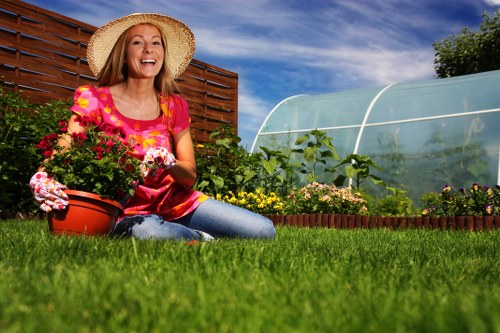
Choosing the Right Plants for Kingston’s Climate
Selecting the appropriate plants is crucial for a successful garden. Kingston experiences a temperate climate with distinct seasons, including cold winters and warm summers, which influences plant selection and garden design.
Native Plants: A Sustainable Choice
Opting for native plants is highly recommended as they are well-adapted to the local environment, requiring less water and maintenance. Some popular native plants in Kingston include:
- Black-eyed Susans
- Hostas
- Daylilies
- Blueberries
- Purple Coneflowers
These plants not only thrive in Kingston’s climate but also attract local wildlife, enhancing the ecological value of your garden.
Seasonal Planting for Year-Round Beauty
Incorporating a mix of evergreen and deciduous plants ensures that your garden remains attractive throughout the year. Consider the following seasonal strategies:
- Spring: Plant flowering bulbs and early bloomers to kickstart the season.
- Summer: Add vibrant annuals and perennials to maintain color and interest.
- Autumn: Incorporate plants with striking foliage and late bloomers.
- Winter: Use evergreens and ornamental grasses to provide structure and texture.
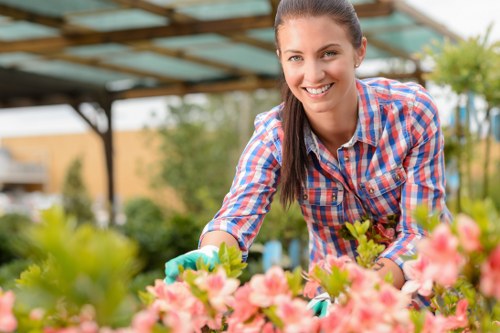
Design Elements in Landscape Gardening
Effective landscape gardening in Kingston involves the thoughtful integration of various design elements to create harmony and balance in your outdoor space.
Hardscaping Features
Hardscaping refers to the non-living elements of your garden, such as:
- Patios and walkways
- Retaining walls
- Fencing
- Water features
- Decks
These features provide structure and functionality, enhancing the overall aesthetic appeal of your garden.
Softscaping Elements
Softscaping includes the living components, primarily plants. Combining different plant types, colors, and textures adds depth and interest to your garden design.
Focal Points
Incorporating focal points like a beautiful tree, a sculpture, or a water feature can draw attention and create a central area of interest in your garden.
Pathways and Lighting
Well-designed pathways guide visitors through your garden, while strategic lighting highlights key features and ensures safety during evening hours.
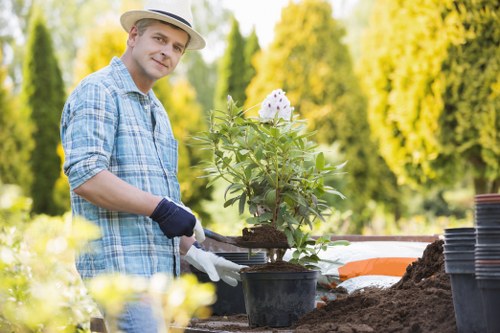
Maintenance Tips for a Thriving Garden
Proper maintenance is essential to keep your landscape garden healthy and beautiful. Here are some tips to ensure your garden thrives:
- Regular Watering: Ensure plants receive adequate water, especially during dry periods.
- Pruning and Trimming: Maintain plant shape and remove dead or diseased branches.
- Weed Control: Keep your garden free from weeds to reduce competition for nutrients.
- Soil Health: Amend the soil with compost and fertilizers to provide necessary nutrients.
- Pest Management: Monitor for pests and take appropriate measures to protect your plants.
Implementing a regular maintenance schedule will help you enjoy a lush and vibrant garden year-round.
Seasonal Maintenance Tasks
Adapting your maintenance routine to the changing seasons ensures your garden remains in optimal condition:
- Spring: Clean up winter debris, plant new flowers, and prepare beds for the growing season.
- Summer: Focus on watering, weeding, and monitoring for pests.
- Autumn: Rake leaves, plant bulbs for spring, and prepare plants for winter.
- Winter: Protect sensitive plants from frost and plan next year’s garden layout.
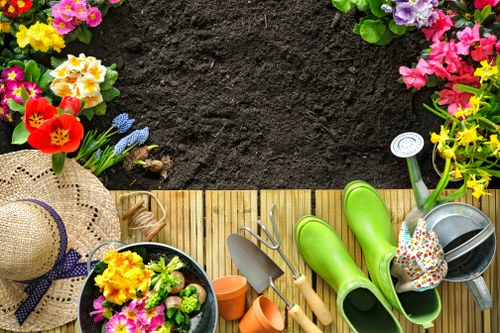
Incorporating Sustainable Practices
Embracing sustainability in your landscape gardening not only benefits the environment but also reduces maintenance efforts and costs.
Rainwater Harvesting
Installing rain barrels can help collect and store rainwater for irrigation, conserving water and reducing your utility bills.
Composting
Creating a compost bin allows you to recycle garden waste, producing rich compost to enhance soil fertility and structure.
Native and Drought-Resistant Plants
Choosing plants that require less water and are adapted to the local climate minimizes water usage and maintenance needs.
Mulching
Applying mulch around plants helps retain soil moisture, suppress weeds, and regulate soil temperature.
Organic Fertilizers
Using organic fertilizers improves soil health without the negative impacts of chemical alternatives.

Enhancing Outdoor Living Spaces
Your garden can serve as an extension of your living space, providing areas for relaxation, dining, and entertainment.
Outdoor Seating Areas
Creating comfortable seating areas with benches, outdoor sofas, and dining sets encourages outdoor living and enjoyment of your garden.
Fire Pits and Outdoor Kitchens
Incorporating fire pits or outdoor kitchens adds functionality and creates focal points for gatherings.
Shade Structures
Adding pergolas, umbrellas, or shade sails provides relief from the sun and extends the usability of your garden during hot days.
Lighting Solutions
Proper outdoor lighting enhances the ambiance and allows you to enjoy your garden even after dark. Consider:
- String lights
- Pathway lighting
- Spotlights for highlighting features
Water Features
Incorporating fountains, ponds, or waterfalls adds a soothing element and attracts wildlife, enhancing the sensory experience of your garden.
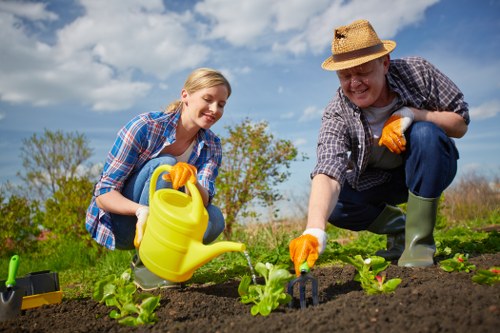
Planning Your Landscape Gardening Project
Successful landscape gardening in Kingston requires careful planning and consideration of various factors. Follow these steps to ensure a well-executed project:
- Assess Your Space: Evaluate the size, layout, and existing features of your outdoor area.
- Define Your Goals: Determine what you want to achieve, whether it’s creating a relaxation area, enhancing curb appeal, or growing your own vegetables.
- Set a Budget: Establish a budget that covers design, materials, plants, and labor.
- Create a Design: Sketch a layout that includes hardscaping, plant placement, and outdoor living areas.
- Choose Suitable Plants: Select plants that thrive in Kingston’s climate and complement your design.
- Implement and Maintain: Execute your plan with the help of professionals and establish a maintenance routine.
Proper planning ensures that your landscape gardening project meets your expectations and stands the test of time.
Hiring the Right Professionals
When selecting a landscape gardener in Kingston, consider the following:
- Experience: Look for professionals with a proven track record in landscape gardening.
- Portfolio: Review their previous projects to assess their design style and quality of work.
- References: Seek testimonials from past clients to gauge satisfaction and reliability.
- Licensing and Insurance: Ensure that the professionals are properly licensed and insured.
Choosing the right team will facilitate a smooth and successful gardening project.
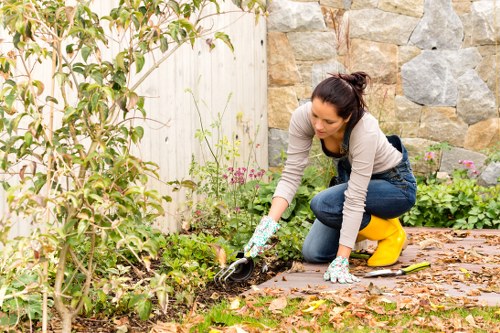
Maximizing Small Gardens in Kingston
Even with limited space, you can create a beautiful and functional garden. Here are some tips for maximizing small gardens:
Vertical Gardening
Utilize vertical space by installing trellises, hanging planters, or vertical garden systems to grow climbing plants and herbs.
Multi-functional Areas
Design spaces that serve multiple purposes, such as a seating area that also functions as a dining space.
Compact Plant Varieties
Choose dwarf or compact plant varieties that take up less space while still providing visual interest.
Smart Storage Solutions
Incorporate built-in benches with storage, vertical shelving, or hidden compartments to keep gardening tools organized without cluttering the space.
Mirrors and Reflective Surfaces
Strategically placing mirrors or reflective surfaces can create the illusion of a larger space and enhance light within the garden.
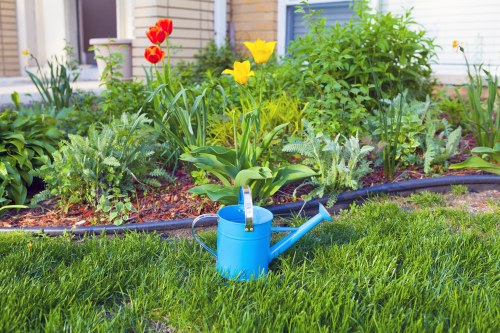
Integrating Technology in Landscape Gardening
Modern technology can simplify garden management and enhance the overall experience of your outdoor space.
Smart Irrigation Systems
Automated watering systems can optimize water usage, ensuring your plants receive the right amount of moisture while conserving resources.
Outdoor Lighting Automation
Smart lighting systems allow you to control outdoor lights remotely, creating ambiance and improving security with ease.
Garden Monitoring Tools
Use sensors and apps to monitor soil moisture, temperature, and plant health, enabling proactive maintenance and care.
Solar-Powered Features
Incorporate solar-powered lights, fountains, or other garden features to reduce energy consumption and promote sustainability.
Virtual Design Tools
Leverage virtual design software to visualize your garden layout, experiment with plant placements, and make informed decisions before implementation.
Common Landscape Gardening Challenges in Kingston
While landscape gardening can be highly rewarding, it also comes with its set of challenges. Being aware of these can help you prepare and mitigate potential issues.
Climate Extremes
Kingston experiences a range of temperatures and weather conditions. Choose resilient plants and provide appropriate protection during extreme weather to ensure garden longevity.
Soil Quality
Poor soil can hinder plant growth. Conduct soil tests and amend the soil with compost or other nutrients to create a fertile environment for your plants.
Pest and Disease Management
Regularly inspect your garden for signs of pests and diseases. Implement integrated pest management strategies to control infestations without harming beneficial insects.
Weed Control
Weeds compete with your plants for nutrients and water. Use mulch, ground covers, and regular weeding to keep unwanted vegetation in check.
Water Management
Ensure proper drainage to prevent waterlogging and consider incorporating rain gardens or swales to manage excess water effectively.
Conclusion: Embrace the Beauty of Landscape Gardening in Kingston
Landscape gardening in Kingston presents an exciting opportunity to transform your outdoor space into a personalized haven. By understanding the local climate, selecting suitable plants, and incorporating thoughtful design elements, you can create a garden that is both beautiful and functional.
Whether you choose to embark on the project yourself or enlist the help of professional landscapers, the key to success lies in careful planning and consistent maintenance. Embrace sustainable practices, integrate modern technology, and continually seek inspiration to keep your garden thriving and evolving.
Are you ready to take the next step in enhancing your outdoor space? Contact us today to begin your landscape gardening journey in Kingston and turn your garden dreams into reality.